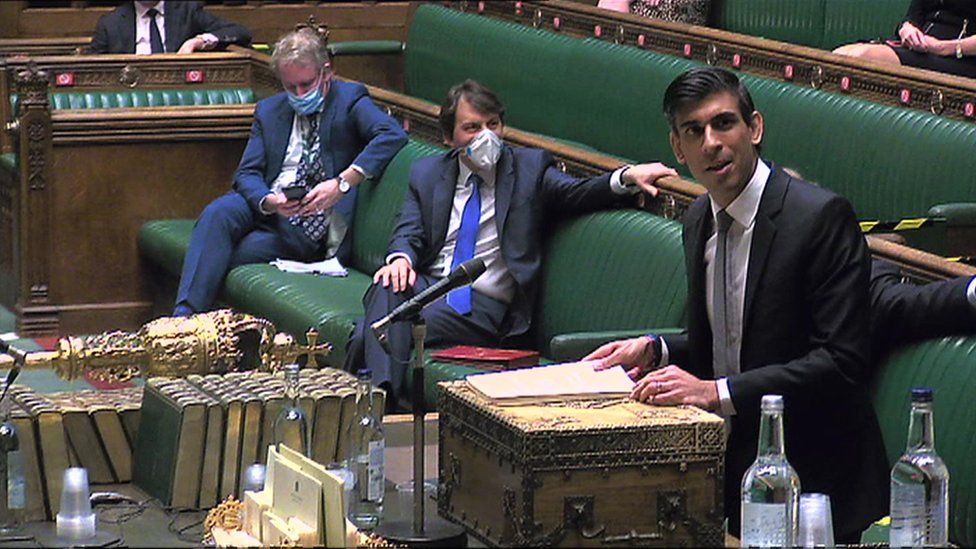The chancellor is delivering his first Budget since the coronavirus pandemic was declared, in the Commons.

Chancellor Rishi Sunak is delivering his first Budget since the coronavirus pandemic was declared.
He has promised to “level” with the public about the state of the UK economy, amid the biggest national debt in more than 50 years.
He is reported to be considering some tax rises to help balance the books.
But his main focus will be on preventing mass job losses and business collapse, as he withdraws emergency support.
He is set to extend furlough to September, paying up to 80% of people’s wages – beyond the date in June the government says most virus restrictions are set to be lifted.
And he will also increase the limit on contactless payments from £45 to £100.
There are reports Mr Sunak is planning to increase some taxes.
A government source has also told the BBC the chancellor is set to extend the £20-a-week top-up to universal credit for six months to help struggling households.
Mr Sunak is also expected to announce that 750 civil service jobs at the Treasury will be transferred to Darlington, in the north-east of England, as part of the government’s plan to move decision-making out of London.
He has already announced:
He will also set out the government’s plans for duties on alcohol, tobacco and fuel.
It has been reported that the rate of corporation tax – paid by businesses on their profits – will rise from 19% to 23%.
The Budget comes at a time when businesses are suffering, while public finances have been damaged by months of Covid restrictions and lockdowns.
Official figures show the UK economy contracted by 9.9% last year and unemployment rose to 5.1% in the three months to December – the worst rate since 2015.
With its tax takings down and its spending up, the government is expected to borrow £394bn during the current financial year – the highest figure seen in peacetime.
But the chancellor will be keen to praise the rollout of vaccines – with more than 20 million people having been given doses across the UK.
He is also expected to reiterate his commitment to reopening the economy, following the “roadmap” set out last week by the prime minister, which would allow Covid restrictions on businesses and individuals to end by 21 June, at the earliest.
However, Mr Sunak will also warn of “challenging times ahead”, with unemployment likely to keep rising for the next few months.
For Labour, shadow Treasury minister Bridget Phillipson said: “We need a Budget that secures Britain’s recovery and rebuilds the economic foundations the Conservatives weakened before the crisis.
“That means a plan to support jobs and businesses, protect family finances and set Britain on the path to a better, more secure future.”
The SNP leader in Westminster Ian Blackford said furlough must be in place “as long as businesses and devolved governments need it”.
He said he was “concerned companies are going to have to step in and pay greater contributions”.
This is the second Budget delivered by Mr Sunak and, as is tradition, the opposition leader, Sir Keir Starmer, will respond.
The previous Budget took place on 11 March last year – the same date as the World Health Organisation declared coronavirus to be a global pandemic.

How will you be affected by this year’s Budget? Email haveyoursay@bbc.co.uk.
Please include a contact number if you are willing to speak to a BBC journalist. You can also get in touch in the following ways:
If you are reading this page and can’t see the form you will need to visit the mobile version of the BBC website to submit your question or comment or you can email us at HaveYourSay@bbc.co.uk. Please include your name, age and location with any submission.